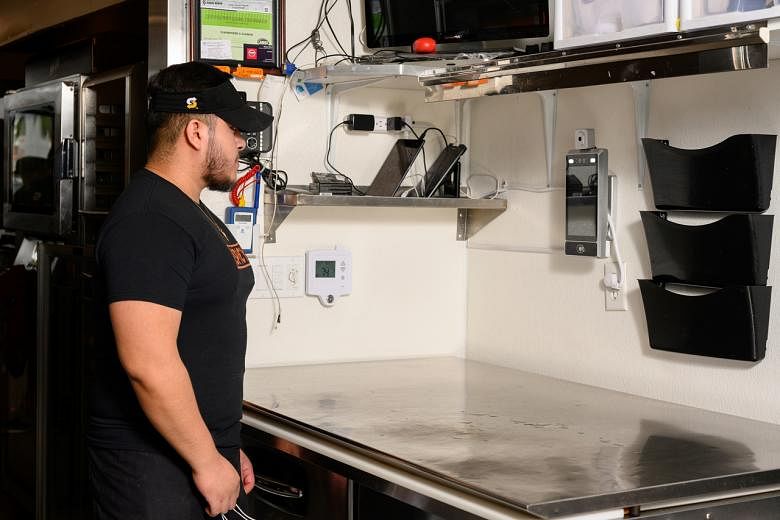NEW YORK (NYTIMES) - Bob Grewal recently began testing a new health-screening setup for workers at a Subway restaurant he owns in Los Angeles near the University of Southern California.
When he stepped inside the employee food prep area, a fever-detection and facial recognition camera service, PopID, quickly identified him by name and gauged his temperature. Then a small tablet screen underneath the camera posted a message that cleared him to enter.
"Thank you Bob, you have a healthy Temp. of 98.06," the screen said. "PopID aims to create a safe environment and stop the spread of Covid-19."
Grewal is one of many business leaders racing to deploy new employee health-tracking technologies in an effort to reopen the economy and make it safer for tens of millions of Americans to return to their jobs in factories, offices and stores.
Some employers are requiring workers to fill out virus-screening questionnaires or asking them to try out social-distancing wristbands that vibrate if they get too close to each other.
Some even hope to soon issue digital "immunity" badges to employees who have developed coronavirus antibodies, marking them as safe to return to work.
But as intensified workplace surveillance becomes the new normal, it comes with a hitch: The technology may not do much to keep people safer.
Public health experts and bioethicists said it was important for employers to find ways to protect their workers during the pandemic. But they cautioned there was little evidence to suggest that the new tools could accurately determine employees' health status or contain virus outbreaks, even as they enabled companies to amass private health details on their workers.
"I think employers need to look carefully before they jump into any of this," said Michael T. Osterholm, director of the Centre for Infectious Disease Research and Policy at the University of Minnesota.
"Some companies are embarking upon things that are not going to help and may actually set us back."
Over the past month, companies have started marketing a slew of employee-tracking tools to combat the virus.
PwC, the financial services firm, has developed a contact-tracing app to help employers "provide a lower-risk workplace for employees".
It will automatically log proximity between employees and can be used to help identify people who may have been exposed to the virus at work.
Salesforce, the giant software company, is offering a new tool, Work.com, to help employers "safely reopen". Among other things, it will enable companies to create online employee health surveys and map the workplace locations visited by employees with coronavirus infections.
Clear, a security company that uses biometric technology to verify people's identities at airports and elsewhere, plans this week to start marketing a health-screening service that can be used to vet and clear employees to enter workplaces. The service will take employees' temperatures with a thermal camera, as well as verify the results of their medical tests for the virus, sharing the results with employers as colour-coded scores like green or red.
Caryn Seidman-Becker, chief executive of Clear, compared her company's multilevel health-screening approach to airport security checks where a person who sets off a metal detector gets a pat-down.
"Nothing is foolproof," Seidman-Becker said. "It's putting them together that allows you to buy down risk and increase confidence."
Companies are adopting new employee-tracking technologies partly in response to White House guidelines asking employers to monitor their "workforce for indicative symptoms" and prohibit employees with symptoms from returning to workplaces unless a health provider has cleared them.
Yet many of the tools - including certain infrared thermometers and antibody tests that would be needed for employee "immunity" certificates - can be wildly inaccurate. Public health experts said the tools could create a false sense of security, leading workers to spread the virus inadvertently.
Fever-screening devices, for example, could miss many of the up to one-quarter or more people infected with the virus who do not exhibit symptoms. Or they could inadvertently expose employees who are running higher temperatures because they are under stress or have other health conditions, issues the workers may have preferred to keep private.
Some law professors and bioethicists also warned that the idea of immunity certificates threatened to create a new class system for employment - one that could unfairly prevent certain people from working just because they had never contracted the virus.
"Do we really want a world where some people can go to work and others can't based on their immunity status?" said Hank Greely, a professor at Stanford Law School who studies the social implications of new health technologies.
"The people who can't will say, 'This is unfair,' and they'll be right."
He and other experts said companies would be better off investing in a proven health intervention - lab testing for coronavirus - for their employees rather than shiny, new surveillance technologies.
Gabrielle Rejouis, a workers' rights advocate at the Centre on Privacy and Technology at Georgetown Law, said employers should be "providing free testing for their workers if they're expecting them to come into work, and also making sure that they are paying sick leave and appropriate health benefits to make sure that workers aren't coming to work sick and infecting their co-workers."











